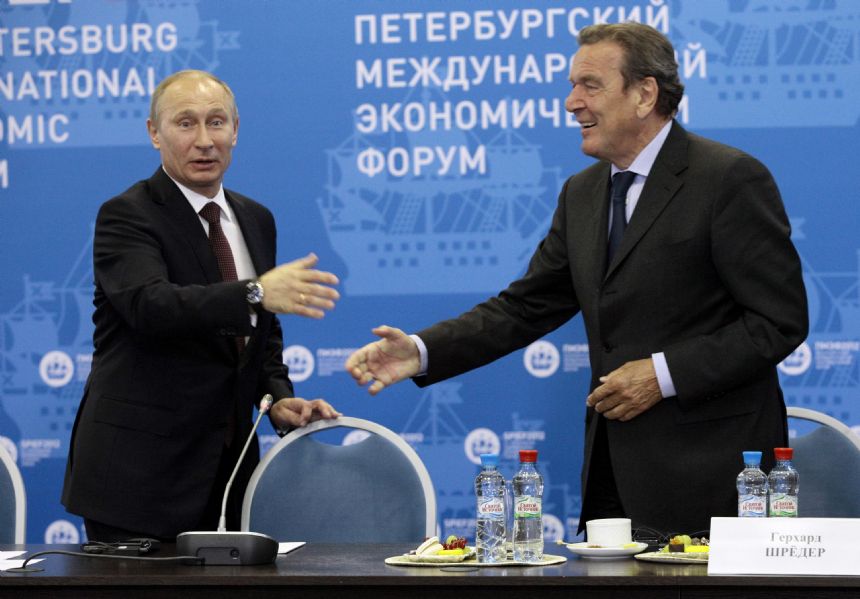- CapperTek
- Sports and Betting News
- Soccer
- Russian ties shred German ex-leader Schroeder's standing
Russian ties shred German ex-leader Schroeder's standing
Mon, May 23, 2022
Soccer News (AP)

BERLIN (AP) - Gerhard Schroeder left the German chancellery after a narrow election defeat in 2005 with every chance of a future as a respected elder statesman.
His ambitious overhaul of the country's welfare state was just beginning to kick in and he had won plaudits among voters for opposing the U.S.-led war in Iraq.
Fast-forward to last week: German lawmakers agreed to shut down Schroeder's taxpayer-funded office, the European Parliament called for him to be sanctioned, and his own party set a mid-June hearing on applications to have him expelled.
Schroeder's reportedly lucrative involvement with the Russian energy sector and his friendly relationship with President Vladimir Putin have raised eyebrows for years, even as many others in Germany backed business and energy ties.
But it was his stubbornness in sticking to his energy posts and his failure to wholeheartedly distance himself from Putin after Russia invaded Ukraine on Feb. 24 that turned the 78-year-old into a political pariah in Germany and estranged him from his party, the center-left Social Democrats of current Chancellor Olaf Scholz.
"Gerhard Schroeder has been acting for many years now only as a businessman, and we should stop seeing him as an elder statesman, as a former chancellor," party co-leader Saskia Esken said last month.
On Friday, Russian state energy company Rosneft said that Schroeder plans to step down from its board of directors, which he had chaired since 2017. The move appeared unlikely to undo the damage to his standing; the Social Democrats' general secretary, Kevin Kuehnert, said it was "unfortunately much too late."
Scholz said he should quit other Russian energy jobs. The ex-chancellor has for years chaired the shareholders' committee of Nord Stream AG and headed the board of directors of Nord Stream 2, a second pipeline built to bring gas directly from Russia to Germany that Scholz's government halted in February.
Schroeder, who rose from a poor, working-class background to become Germany's leader, was chancellor from 1998 to 2005. He initiated an overhaul of Germany's labor market that was unpopular at the time but was later credited with making Europe's biggest economy more competitive, helping it weather a series of crises.
He also vehemently opposed the U.S.-led war in Iraq, a stance that struck a chord with German voters and helped him secure his second term, but chilled relations with President George W. Bush.
Schroeder bonded with Putin, however. He welcomed the Russian leader to his home in Hannover, while the pair also made a joint appearance on a German television talk show. Asked in 2004 whether he considered Putin a "flawless democrat," the chancellor replied that he did.
Within weeks of leaving office, Schroeder drew criticism for his appointment to a German-Russian consortium building the Nord Stream gas pipeline under the Baltic Sea, which he had championed as chancellor. He said it was "a matter of honor" to help.
In April 2014, he was pictured hugging Putin at a party in St. Petersburg marking his 70th birthday, just as tensions between Russia and the West soared following Russia's annexation of Crimea.
In early February this year, Russian state-owned gas company Gazprom said he had been nominated to join its board of directors - shortly after the ex-chancellor had accused Ukraine of "saber-rattling." It's unclear whether the appointment, which was to be confirmed in June, will go ahead.
When Scholz visited Moscow shortly before Russia's invasion, Putin praised Schroeder as an "independent expert" and "a decent person whom we respect." He said Germans who didn't want to pay much more for gas should be thankful to their former leader.
On the day of the invasion, Schroeder said it was the Russian government's responsibility to end the war as soon as possible, and that Moscow's security interests didn't justify a military intervention. But he didn't address his own energy posts, and said in a LinkedIn post that "there were many mistakes - on both sides" in relations between Russia and the West.
Schroeder's stock plummeted further. He gave up the title of honorary citizen of Hannover, preempting a likely decision by city officials, and had his honorary membership of Germany's soccer federation and leading soccer club Borussia Dortmund withdrawn. Staff resigned in protest. Prominent Social Democrats urged him to leave the party he led from 1999 to 2004; the party's Hannover branch received 14 applications for his expulsion, which it plans to consider on June 15.
Schroeder was defiant in an April interview with The New York Times, declaring that "I don't do mea culpa." And he was quoted as saying that a massacre in Bucha, outside Kyiv, "has to be investigated" but he didn't think the orders would have come from Putin.
It's not clear what eventually prompted Schroeder to pull out of Rosneft. But the announcement came a day after German lawmakers decided to strip him of his office, while the European Parliament approved a resolution that "strongly demands" he give up his positions with Russian firms and calls for politicians "who continue to receive Russian money" to be sanctioned. Scholz indicated that he doesn't support sanctions against Schroeder at present.
"The public self-destruction of his reputation was as sad to watch as it was unsettling," the Sueddeutsche Zeitung newspaper commented. "No one could explain how a man who was once marked by outstanding political instinct let the discussion run until his privileges were withdrawn."
___
Follow the AP's coverage of the war at https://apnews.com/hub/russia-ukraine